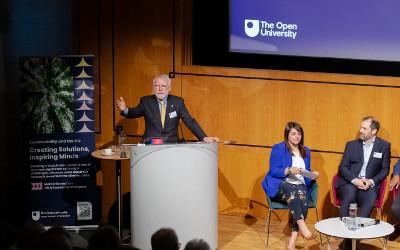Uneasy Brexit: What went wrong?

Brexit was due to happen today (Friday 29 March). Even the Supreme Court accepted the idea that giving notice under Article 50 was like pulling a trigger and the bullet would hit its target. So, what went wrong with the Metaphorical Brexit? Simon Lee, Professor of Law gives his view:
"After two years of being told that the United Kingdom was going to leave the European Union on 29 March 2019, the dawn of the day itself, with us still in the EU, feels like my birthday. This is because it is my birthday. It was always going to be my birthday, irrevocably, ever since I was born four days after the Treaty of Rome was signed in March 1957.
Article 50 is not irrevocable
In contrast, when all parties in R (on the application of Miller and Santos) v Secretary of State for Exiting the European Union argued the case in November and December 2016 on the assumption that a notification of intent to withdraw under Article 50 of the Lisbon Treaty was irrevocable, that did not mean it actually was irrevocable in law or in politics or in the event. It did not even mean that the parties or their counsel thought that really was the legal position. It suited those challenging the Government as they could argue that rights would be affected. It suited the government who would not have relished the interpretation of Article 50 being referred to the Court of Justice of the European Union, when Brexiteers’ rhetoric was about taking back control from that very institution.
That Court subsequently, in December 2018, made clear in Case C-621-18 Wightman v Secretary of State for Exiting the European Union that Article 50 is not irrevocable.
‘A real bullet does not take two years to reach its target’
Even before Miller, in the Northern Ireland High Court on 28 October 2016, Mr Justice Maguire’s impeccably orthodox judgment in the McCord challenge had already concluded that:
...there is a distinction to be drawn between what occurs upon the triggering of Article 50(2) and what may occur thereafter. As the Attorney General for Northern Ireland put it, the actual notification does not in itself alter the law of the United Kingdom. Rather, it is the beginning of a process which ultimately will probably lead to changes in United Kingdom law. On the day after the notice has been given, the law will in fact be the same as it was the day before it was given.
As Maguire J wisely observed, ‘While the wind of change may be about to blow, the precise direction in which it will blow cannot yet be determined’. I praised that judgment then and it has stood the test of time.
In contrast, the majority eight Justices in the UK Supreme Court stated in their January 2017 judgment that, ‘As Lord Pannick QC put it for Mrs Miller, when ministers give Notice they will be “pulling…the trigger which causes the bullet to be fired, with the consequence that the bullet will hit the target and the Treaties will cease to apply” …’
This was a mesmerising example of advocacy by Lord Pannick who has had a splendidly even-handed role in the overall Brexit saga as a barrister, a journalist and a cross-bench peer, from popular acclaim to his recent, relatively unpopular, letter to The Times supporting a possible interpretation of the Vienna Convention which might help the Attorney General and the government.
Nevertheless, as one of the dissenting judges, Lord Carnwath, observed, ‘Lord Pannick’s trigger/bullet analogy is superficially attractive, but (with respect) fallacious. A real bullet does not take two years to reach its target. Nor is its progress accompanied by an intense period of negotiations over the form of protection that should be available to the victim by the time it arrives.’
‘The tide is slowly ebbing back’
Quite so. Metaphors matter and other metaphors were available. Pointing out the constitutional complexities of Dicey Sentiments, as I tried to do before oral argument in Miller, is not enough. The public square is captured by an appealing metaphor.
We might, for instance, have paddled around more in the ‘ebbing tide’, a reference I made immediately after the 2016 referendum to the inevitable mess that would be left as ‘the incoming tide’ of European law, as it had famously been called by Lord Denning, started to recede:
when we come to matters with a European element, the Treaty is like an incoming tide. It flows into the estuaries and up the rivers. It cannot be held back … the flowing tide of Community law is coming in fast. It has not stopped at high-water mark. It has broken the dykes and the banks. It has submerged the surrounding land. So much so that we have to learn to become amphibious if we wish to keep our heads above water’.
With the Royal Courts of Justice in London being in the Strand, and thinking that his successor as Master of the Rolls and other judges might like to pay tribute to Lord Denning’s metaphor by looking at the withdrawal of European law as being on the ebb tide, I drew attention to these lines:
A long low gurgle down the strand,
The sputtering of the drying wrack
The tide is slowly ebbing back
With listless murmuring from the land …’
Today shows that the Supreme Court majority were wrong two years ago in their adoption of the trigger/bullet metaphor and Lord Carnwath was right, while 45 years ago Lord Denning, himself something of a tidal wave in the law, gave us a metaphor to remember."
Simon Lee is Professor of Law, The Open University, and Emeritus Professor of Jurisprudence, Queen’s University Belfast.
Simon Lee @paradoxbridge
Quarterly Review of Research
Read our Quarterly Review of Research to learn about our latest quality academic output.

Contact our news team
For all out of hours enquiries, please telephone +44 (0)7901 515891
